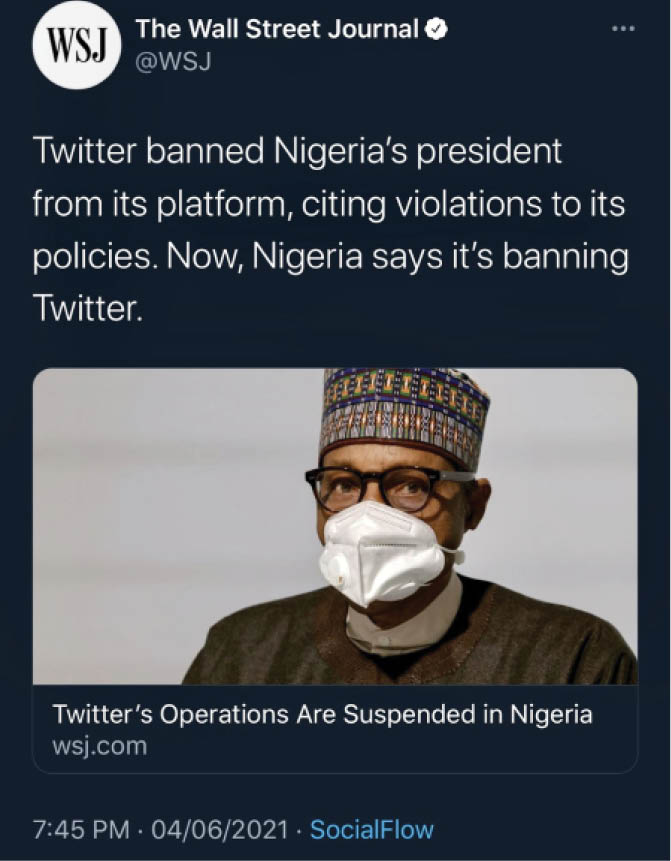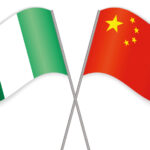A report published by the World Street Journal claimed that Twitter banned President Muhammadu Buhari, a development that led to Nigeria suspending the online medium in Nigeria.
Verdict: False. The report that Twitter banned President Buhari is false. It is also false that Nigeria banned Twitter. The site removed a tweet it considered a violation of its policy. Nigeria suspended the site indefinitely.
- El-Rufai’s unending controversies keep Kaduna in the eyes of the storm
- Synagogue: What TB Joshua said before he died
Full text
On June 4, 2020, the World Street Journal, @WSJ, reported that Twitter banned Nigeria’s president from its platform. The Journal reported that Twitter cited violations to its policies as the justification for the ban.
The medium stated that the development led to Nigeria’s decision to also suspend Twitter.
Tweeting via its official handle, @WSJ, by 7:45 pm on June 4, the Journal claimed, “Twitter banned Nigeria’s president from its platform, citing violations to its policies. Now, Nigeria says it’s banning Twitter.”
Twitter’s ban policy
The site’s rules provide a ban for any account with the risk of incitement of violence.
A ban is a punishment for any account that goes against the company’s policy against the glorification of violence.
Twitter’s chief financial officer, Ned Segal, explained that once banned from the site, you cannot open another account in your name or authorise a third party to operate an account to spread your information in whatever guise.
For instance, former U.S President Donald Trump was banned from Twitter, where he had more than 88 million followers, and multiple other social media platforms following the siege of the U.S Capitol by his supporters.
Also, the company suspended several accounts that were set up to share statements from a new part of the former U.S President Donald Trump’s website, saying they broke its rules against evading an account ban.
But how true is the report that Twitter banned President Buhari from the site?
Verification
A review of Twitter’s action taken against President Buhari showed that the company deleted the president’s tweet deemed a violation of the site’s policy.
President Buhari had on June 1, via his verified Twitter handle, @Mbuhari, referenced Nigeria’s civil war of 1967 in a statement on the ongoing confrontation between the proscribed Indigenous People of Biafra (IPOB) and security agencies.
He tweeted, “Many of those misbehaving today are too young to be aware of the destruction and loss of lives that occurred during the Nigerian civil war. Those of us in the field for 30 months, who went through the war, will treat them in the language they understand.”
Many Nigerians reported the president’s tweet, leading to its removal by the company.
In a statement, Twitter noted, “In line with our global policies, we have removed a post from President Buhari’s Facebook page for violating our Community Standards against inciting violence.
“We remove any content from individuals or organisations that goes against our policies on this platform,” Facebook stated on Friday.”
Twitter also deleted the video where the president made the speech, which was posted on the handle of the Ministry of Information and Culture.
On June 5, the Minister of Information and Culture, Alhaji Lai Mohammed, announced the suspension of Twitter.
Though Mohammed did not mention the reason for the ban in a statement, he pointed out “the persistent use of the platform for activities capable of undermining Nigeria’s corporate existence.”
A check on the president’s Twitter account on June 5, four days after his tweet was deleted, showed that the account was not banned.
According to Twitter, if you are banned from the platform, you are removed from the site and will not be added. For instance, shortly after former President Trump was banned from Twitter, the company’s chief financial officer, Ned Segal, said during an interview on CNBC that once you are banned from the site your tweeting privilege would be withdrawn for good.
“The way our policies work is that when you are removed from the platform you are removed from the platform, whether you are a commentator, CFO, former or current public official.
“Remember, our policies are designed to make sure that people are not inciting violence, and if anybody does that, we have to remove them from the service and our policies don’t allow people to come back,” Segal said.
In the case of President Buhari, his Twitter account was not removed and his tweeting privileges were not withdrawn.
Conclusion
The report that Twitter banned President Buhari from its platform is false. It is also false that Nigeria banned Twitter. The site removed a tweet it considered a violation of its policy. Nigeria suspended the site indefinitely.

 Join Daily Trust WhatsApp Community For Quick Access To News and Happenings Around You.
Join Daily Trust WhatsApp Community For Quick Access To News and Happenings Around You.


